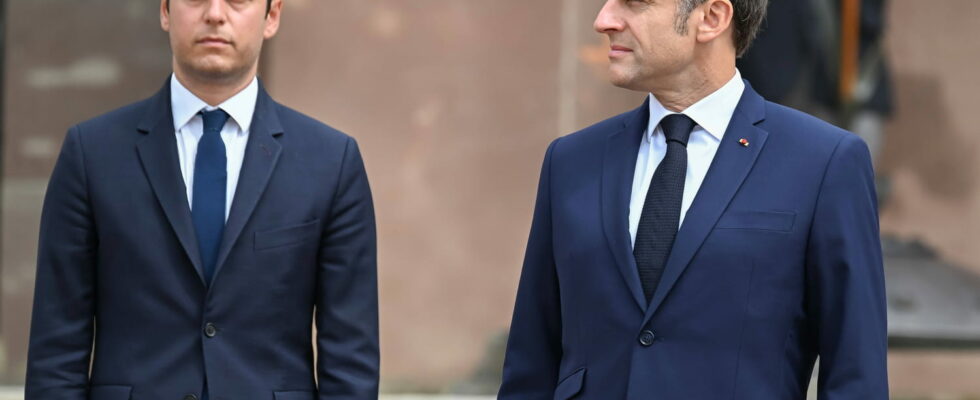A change of government could take place after the second round of early legislative elections. Some ministers are particularly in the hot seat.
As the second round of early legislative elections approaches, several ministers could find themselves on an ejection seat. Candidates in their constituency, they could be pushed out in the event of defeat.
Gabriel Attal also sees his position as Prime Minister threatened. During the first round of the legislative elections this Sunday, June 30, the presidential majority came in third place (20.76%), with a significant delay over its opponents the New Popular Front (28.14%) and the National Rally (33.15%). A victory in the second round therefore seems very difficult and Gabriel Attal could therefore be forced to leave his position as Prime Minister after only a few months. Tradition dictates that the Prime Minister presents a courtesy resignation after a defeat at the polls, which is then accepted or rejected by the Head of State. Even in the event of remaining without a majority in the Assembly, the head of the executive risks being overthrown by the first motion of censure. Similarly, if Renaissance managed to remain in the majority thanks to a coalition formed with the forces of the “republican arc” ranging from the socialist left to the traditional right, a change of Prime Minister would also be necessary to formalize this coalition. Gabriel Attal is far from being the only one in the hot seat.
Which ministers are in danger?
24 ministers ran for the legislative elections in their constituency and none were directly elected in the first round. Some are even in a bad position and could see their place in the government slip away from them.
Gérald Darmanin (Minister of the Interior), Thomas Cazenave (Minister Delegate for Public Accounts of France), Stéphane Séjourné (Minister of Foreign Affairs), Prisca Thevenot (Government Spokesperson), Olivia Grégoire (Minister Delegate for Small and Medium Enterprises), Jean-Noël Barrot (Minister Delegate for Europe), Aurore Bergé (Minister for Equality), Marie Lebec (Minister Delegate for Relations with Parliament), Hervé Berville (Secretary of State for the Sea and Biodiversity) and Roland Lescure (Minister Delegate for Industry and Energy) came in first place in their constituencies. If they are in pole position, some of the second-round duels could prove very close. The result will depend on the transfer of votes from voters who saw their candidate eliminated in the first round or who withdrew.
Stanislas Guérini (Minister for Digital Transformation), Franck Riester (Minister Delegate for Foreign Trade), Frédéric Valletoux (Minister of Health), Agnès Pannier-Runacher (Minister Delegate to the Minister of Agriculture), Marc Fesnau (Minister of Agriculture), Sarah El Haïry (Minister Delegate for Children, Youth and Families), Marina Ferrari (Secretary of State for Digital Affairs), Guillaume Kasbarian (Minister Delegate for Housing) are in greater danger since they came second in their constituency. To save themselves, they are counting on a transfer of votes in their favour.
Patricia Mirallès (Secretary of State to the Minister of the Armed Forces) is in a really bad position, having only reached third place, but she preferred not to withdraw and try her luck in the second round. Conversely, it is the end of the race for Marie Guévenoux (Minister Delegate for Overseas Territories), Sabrina Agresti-Roubache (Secretary of State for the City of France), Fadila Khattabi (Minister for Disabled People) and Dominique Faure (Minister Delegate for Rural Affairs) who withdrew from the rest of the vote.
In the event of defeat, all these ministers could face a reshuffle.
What date for a possible reshuffle?
In the event of a cabinet reshuffle, it will take place a few days after the results of the legislative elections. We should expect a rapid reshuffle, especially with the upcoming Olympic Games, which require active ministers, whether in the Interior, Transport or, of course, Sports.
The President of the Republic may decide to reshuffle the government for various reasons, such as to give new impetus to a government or to respond to political crises. In this case, it will be imposed on him for one reason: without a relative majority or without the support of the deputies, the government will fall. The President will appoint the Prime Minister and, on the latter’s proposal, will appoint the other members of the government.
What potential new ministers?
The new ministers will depend on the appointed Prime Minister. If Jordan Bardella were chosen following an RN victory, his “national unity” government would not be composed solely of RN members. Already, Eric Ciotti, who formed the alliance with the RN, could find an important place in it. Marine Le Pen has stated that it would include “people who want to participate in the recovery of the country, whether they are from the left or the right” as well as members of civil society.
If the victory was finally for the NFP, several names were mentioned for the post of Prime Minister: Jean-Luc Mélenchon, François Ruffin, Fabien Roussel, Manuel Bompard, Boris Vallaud…
